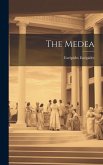This study examines how one of the most popular and glamorous figures of Greek mythology was imagined on the tragic stage of fifth-century Athens. Dr Michelakis argues that dramatists persistently appropriated Achilles to address concerns of their time, from heroism and education to individualism and gender. Whether an aristocrat, a dead warrior or a young man, the tragic Achilles serves as a receptacle for competing definitions of heroism, oscillating between presence and absence, the exceptional and the paradigmatic. Tragedy draws on Achilles to display and pit against one another contrasting views of the mythological self and of its rights and obligations, powers and limitations. The book considers the whole corpus of extant Greek tragedy, with particular attention paid to Aeschylus' Myrmidons and Euripides' Hecuba and Iphigenia at Aulis.








